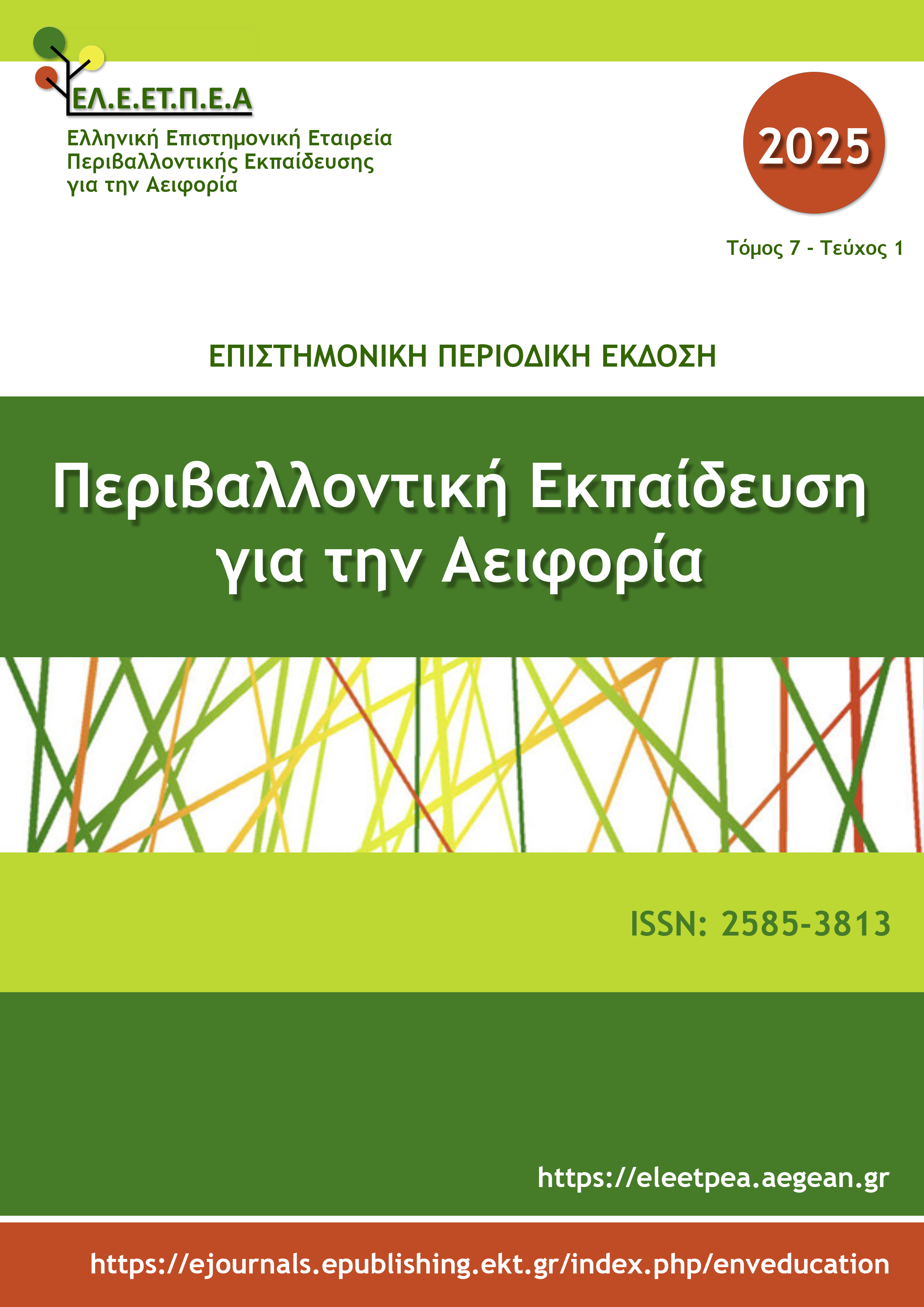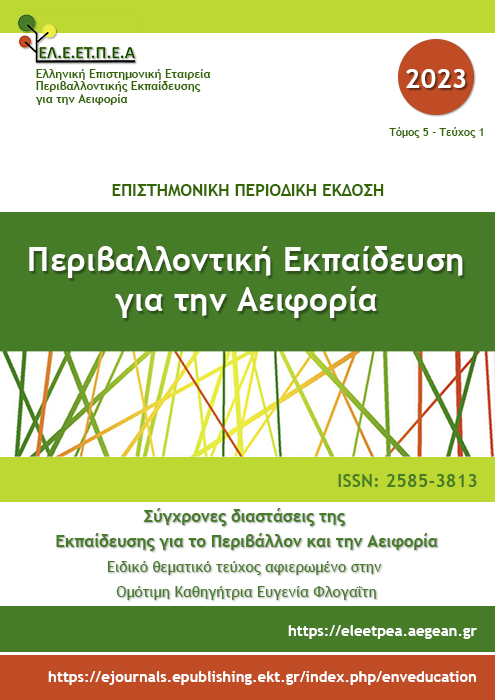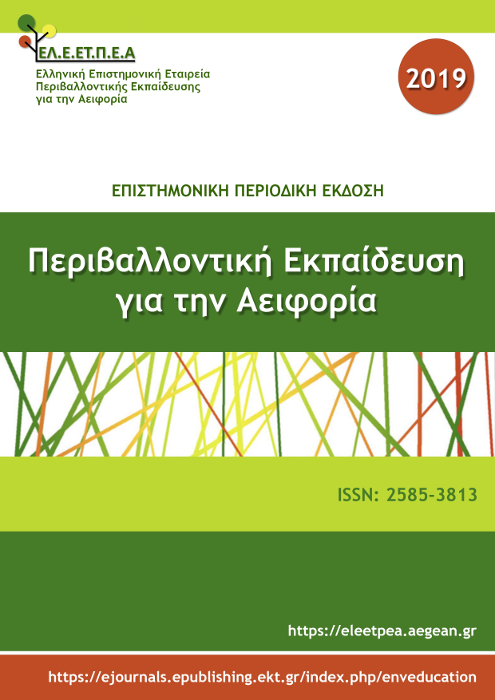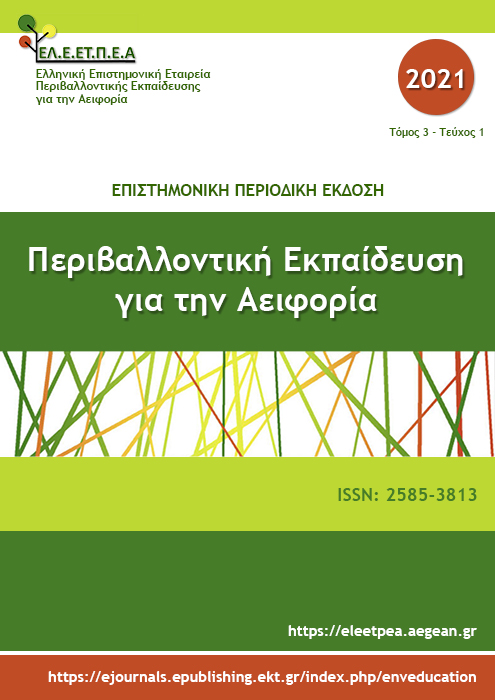Διδάσκοντας την κλιματική κρίση στο δημοτικό σχολείο: αντιλήψεις και αυτοαποτελεσματικότητα εκπαιδευτικών

Περίληψη
Η κλιματική κρίση αποτελεί μια από τις σημαντικότερες προκλήσεις της σύγχρονης εποχής. Ο ρόλος της εκπαίδευσης στην ενημέρωση, ευαισθητοποίηση και ενεργοποίηση των πολιτών γύρω από αυτό το ζήτημα έχει αναγνωριστεί διεθνώς. Η παρούσα έρευνα μελετά τις βασικές αντιλήψεις εκπαιδευτικών πρωτοβάθμιας εκπαίδευσης σχετικά με την κλιματική κρίση, την αυτοαποτελεσματικότητά τους ως προς τη διδασκαλία της στο σχολείο, καθώς και την πιθανή σχέση μεταξύ των δύο αυτών διαστάσεων. Η έρευνα διεξήχθη με τη χρήση ερωτηματολογίου που μοιράστηκε σε 132 εκπαιδευτικούς στις περιφέρειες Ιωαννίνων και Αττικής. Μεταξύ των κυριότερων αποτελεσμάτων, διαπιστώνεται ότι οι εκπαιδευτικοί αντιλαμβάνονται την κλιματική κρίση ως ένα από τα κρισιμότερα προβλήματα του πλανήτη, όχι όμως και της χώρας μας. Οι ιδέες που καταγράφουν σχετικά με τα αίτια, τις επιπτώσεις και τους τρόπους αντιμετώπισης του ζητήματος είναι περιορισμένες και δεν διεισδύουν σε βάθος. Οι συμμετέχοντες δεν θεωρούν επαρκή την εκπαίδευσή τους γύρω από αυτό το ζήτημα αλλά είναι πεπεισμένοι για την αναγκαιότητά του στο σχολικό πρόγραμμα σπουδών. Τα επίπεδα αυτοαποτελεσματικότητας των εκπαιδευτικών για τη διδασκαλία της κλιματικής κρίσης είναι οριακά πάνω από το μέτριο. Το εύρημα ότι όσοι είναι περισσότερο ευαισθητοποιημένοι στο ζήτημα και εκείνοι που έχουν δεχτεί επαρκή εκπαίδευση παρουσιάζουν υψηλότερη αυτοαποτελεσματικότητα, υπογραμμίζει την αναγκαιότητα περαιτέρω επιμόρφωσης.
Λεπτομέρειες άρθρου
- Πώς να δημιουργήσετε Αναφορές
-
Ένεζλη Α., Γαβριλάκης Κ., & Λιαράκου Γ. (2025). Διδάσκοντας την κλιματική κρίση στο δημοτικό σχολείο: αντιλήψεις και αυτοαποτελεσματικότητα εκπαιδευτικών. Περιβαλλοντική Εκπαίδευση για την Αειφορία, 7(1), 1–20. https://doi.org/10.12681/ees.39216
- Ενότητα
- Articles

Αυτή η εργασία είναι αδειοδοτημένη υπό το CC Αναφορά Δημιουργού – Μη Εμπορική Χρήση – Παρόμοια Διανομή 4.0.
Οι συγγραφείς διατηρούν τα πνευματικά δικαιώματα και παρέχουν στο περιοδικό το δικαίωμα της πρώτης δημοσίευσης μαζί με την αδειοδότηση της εργασίας με CC-BY-NC-SA, που επιτρέπει σε άλλους να μοιράζονται αυτή την εργασία με αναγνώριση του συγγραφικού δικαιώματος και την αρχική δημοσίευση σε αυτό το περιοδικό.




